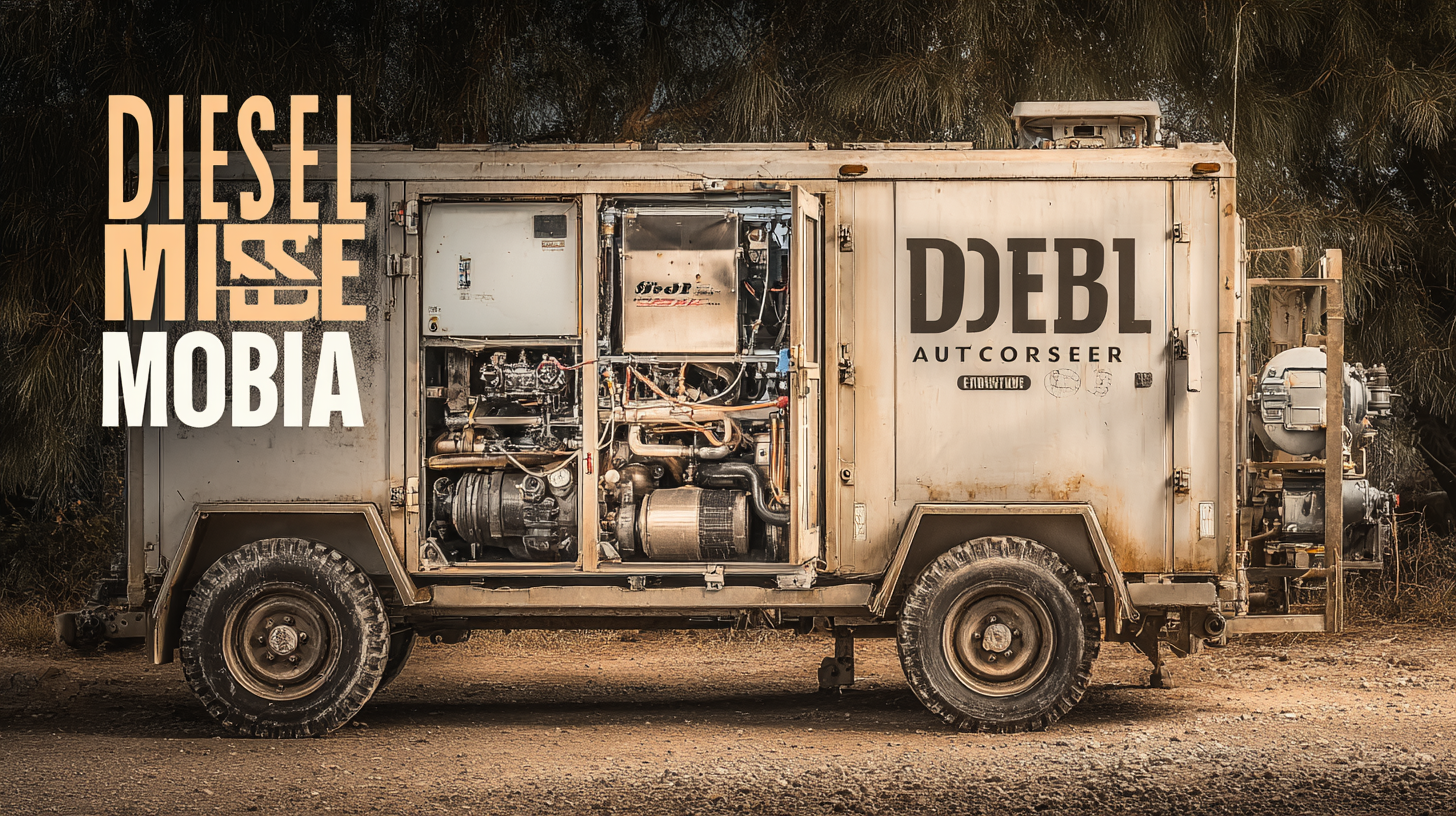
Exploring the Advantages of Using the Best Diesel Mobile Air Compressor for Your Business
In today's fast-paced industrial landscape, having the right equipment can significantly elevate operational efficiency and productivity. One essential piece of machinery gaining recognition is the Diesel Mobile Air Compressor. According to a recent report by Research and Markets, the global air compressor market is projected to reach approximately $40 billion by 2025, with the mobile segment being a significant contributor to this growth. Diesel Mobile Air Compressors, in particular, are celebrated for their superior performance, mobility, and reliability, making them the go-to choice for businesses working in construction, manufacturing, and other demanding environments.

These compressors not only offer robust power output but also provide the flexibility to operate in remote locations where electricity may be unavailable, thereby streamlining workflows and reducing downtime. As we explore the advantages of integrating the best Diesel Mobile Air Compressor into your business operations, it becomes clear that such an investment not only enhances productivity but also contributes to long-term cost savings.
Understanding Diesel Mobile Air Compressors: Key Features and Benefits
 Diesel mobile air compressors have become increasingly popular in various industries, particularly for their robust performance and versatility. These machines are designed with key features such as high portability, powerful output, and durability, making them ideal for construction sites, mining operations, and maintenance tasks. The recent introduction of advanced diesel compressors highlights the growing demand for equipment that can withstand tough working environments while maintaining efficiency.
Diesel mobile air compressors have become increasingly popular in various industries, particularly for their robust performance and versatility. These machines are designed with key features such as high portability, powerful output, and durability, making them ideal for construction sites, mining operations, and maintenance tasks. The recent introduction of advanced diesel compressors highlights the growing demand for equipment that can withstand tough working environments while maintaining efficiency.
When choosing a diesel mobile air compressor for your business, consider the size of the compressor and its air delivery rates. For instance, a unit that provides higher CFM (cubic feet per minute) can ensure that multiple tools can operate simultaneously, improving your workflow. Additionally, assess the fuel efficiency of the model, as lower fuel consumption translates to reduced operating costs over time.
Tip: Always evaluate the service and support options provided by the manufacturer. Reliable customer support can greatly enhance your operational efficiency should any issues arise. Another essential tip is to look for models with eco-friendly features, reflecting a commitment to sustainable practices while ensuring compliance with regulations in your industry.
Comparing Diesel vs. Electric Air Compressors for Mobile Applications
When considering mobile applications, businesses often face the decision between diesel and electric air compressors. Diesel air compressors are renowned for their durability and high performance, especially in heavy-duty environments, making them a popular choice among professionals in construction and industrial sectors. The global market for mobile air compressors is anticipated to grow at a compound annual growth rate (CAGR) of approximately 4.9% from 2025 to 2034, reflecting a robust demand for versatile and reliable power sources in various applications.
Conversely, electric air compressors offer significant advantages in terms of sustainability and operational costs. As the portable air compressor market is expected to increase from $1,780 million in 2025, businesses are increasingly considering electric options that not only reduce carbon emissions but also lower total operating expenses over time. With advancements in battery technology, electric compressors are becoming more competitive in performance, suggesting a shift in preferences among users looking for cost-effective and eco-friendly solutions. Ultimately, the choice between diesel and electric compressors will depend on specific project needs and operational considerations, making it essential to evaluate both options carefully.
Ideal Industries for Using Diesel Mobile Air Compressors
Diesel mobile air compressors have become indispensable tools across various industries due to their portability, efficiency, and power. Construction sites are one of the primary sectors that benefit from these robust machines. With the ability to operate in remote locations without the need for a power source, diesel mobile air compressors make it easy to power pneumatic tools, operate jackhammers, and perform tasks demanding high-pressure air. Their durability and ease of transport mean they enhance productivity while minimizing downtime, an essential factor in any construction project.
Another key industry benefiting from diesel mobile air compressors is mining. In this sector, reliable and consistent air supply is critical for drilling operations and pneumatic equipment. The rugged nature of mining environments demands robust machinery that can withstand harsh conditions, and diesel compressors fit the bill perfectly. Additionally, the mobility of these compressors allows for flexibility in operations, enabling crews to move them to different sites as needed, thereby optimizing resource use and increasing efficiency in the extraction process.
Maintenance Tips to Maximize Efficiency of Diesel Air Compressors
Using diesel mobile air compressors can significantly enhance productivity and operational efficiency in various industries. However, to fully harness their benefits, it's essential to prioritize maintenance. Reports suggest that regular and proper maintenance can prolong the lifespan of diesel air compressors by up to 50%. This not only minimizes repair costs but also ensures that the equipment runs at peak performance.

Tip 1: Regularly inspect and change the oil as per the manufacturer's recommendations. Clean oil reduces friction and enhances performance, which is crucial, especially in demanding work environments.
Tip 2: Monitor air filters closely. According to industry studies, clogged filters can reduce efficiency by as much as 25%. Keeping filters clean ensures maximum airflow and optimal operation of the compressor.
Maintaining a proper schedule for preventive maintenance can help businesses avoid unexpected breakdowns and prolong equipment life. By being proactive and attentive to the care of diesel air compressors, companies can maximize efficiency and reduce operational costs in the long run.
Cost-Benefit Analysis: Investing in a Quality Diesel Mobile Air Compressor
Investing in a quality diesel mobile air compressor can significantly enhance operational efficiency and reduce long-term costs for businesses across various industries. A thorough cost-benefit analysis reveals that while the initial investment might be higher compared to standard electric compressors, the advantages of durability, portability, and power make diesel models a worthwhile choice. Diesel compressors are designed for rugged conditions, providing reliable performance even in the most challenging environments, which leads to lower maintenance costs and reduced downtime.
Furthermore, the energy efficiency of diesel-powered equipment often translates to lower operational costs over time. With advancements in technology, these compressors now offer better fuel economy and increased productivity. For businesses relying heavily on air-powered tools and machinery on job sites, the ability to move equipment easily without the constraints of electrical outlets can lead to substantial savings in time and labor costs. Ultimately, considering both the immediate and long-term financial impacts, investing in a quality diesel mobile air compressor can provide a significant edge in today’s competitive marketplace.
Exploring the Advantages of Using the Best Diesel Mobile Air Compressor for Your Business - Cost-Benefit Analysis
| Feature | Benefit | Estimated Cost | Expected Lifespan | Return on Investment (ROI) |
|---|---|---|---|---|
| Portable Design | Easy transportation to job sites | $3,500 | 10 years | 200% |
| High Efficiency | Reduced fuel consumption | $3,000 | 12 years | 250% |
| Durability | Long-lasting performance in tough conditions | $4,200 | 15 years | 300% |
| Versatility | Can power various tools and equipment | $3,800 | 12 years | 225% |
| Low Maintenance | Fewer repairs, lower operational costs | $3,200 | 14 years | 240% |
